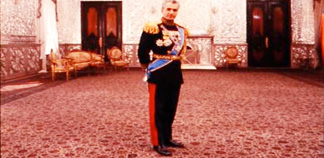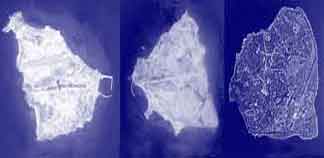به زبان فارسی
PICTORY
LATEST MUSIC
SEARCH
REFLECTION
25-Nov-2008 (28 comments)
First of all, one has to remember that it is easy to criticise all of this in retrospect, just as it is easy to underestimate the repression of the shah and the islamic republic. The influence that the Fedayeen had in the birth of the new left and on the Iranian revolution is historic and cannot be taken away, though a very heavy price was paid for it. But there were many mistakes - militarism, Stalinism, centralism, the culture of the heroic guerilla and the professional revolutionary. As the organisation disintegrated, not surprisingly heroes suddenly became villains in the eyes of many supporters. A lesson that I personally learnt is that without debate, without democracy, without the ability to discuss every aspect of theory, your organisation will end up as a sect rather than a serious force capable of leading a revolution>>>
CASPIAN
06-Nov-2008 (33 comments)
هدف از مذاکرات بین کشورهای همجوار دریای خزر تقلیل سهم ایران در دریای خزر از 50% طبق قرارداد 1940 به 11% می باشد. درصورت موفقیت این مذاکرات تمامیت ارضی ایران دوباره خدشه دار خواهد شد و ضررات ناشی از آن به مراتب سهمگین تر از قراردادهای ننگین گلستان و ترکمانچای خواهد بود. زیرا که در کل 11% سهمی که برای ایران در نظر گرفته شده منابع نفتی وجود ندارد و در نتیجه عقد قرارداد جدید دست ایران از تمام منابع عظیم خزر کوتاه خواهد شد. دو مقاله زیر تفسیری در این مورد به کوشش تیمسار آریان پور و آقای سازگارا می باشد که مکمل یکدیگر می باشند. مقاله آقای سازگارا موقعیت فعلی را ترسیم می کند و مقاله تیمسار آریان پور تاریخچه خزر و موقعیت آن در دوره پهلوی را. آمار ارائه شده تکان دهنده هستند. اگر دست روی دست بگذاریم و از این فاجعه جلوگیری نکنیم عواقب آن دامنگیر چندین نسل آینده خواهد بود. متاسفانه اکثر ایرانیان از این خطر آگاه نیستند.>>>
KOOROSH
02-Nov-2008 (12 comments)
يکی از دوستان جوانم از تهران آدرس مقاله ای را روی اينترنت برايم فرستاد، در يکی از سايت های حزب کمونيست کارگری، با عنوان «گرامیداشت روز کورش، نوستالژی رژیم گذشته! مردم نه ایران اسلامی و نه ایران اهورایی نمی خواهند!» (بگذريم که منفی در منفی مثبت می شود و اين عنوان معنای عکس بخود می گيرد. اما به ما چه، ما که معلم ديکته و انشای کسی نيستيم). باری، و به همراه اين مقاله يادداشتی فرستاده بود مبنی بر اين که مقاله مال هفتم آّبان سال پيش است اما يکی دو نفر را می شناسم که از هواداران حزب کمونيست کارگری هستند و امسال مقاله را تکثير و در هر کجا که توانسته اند پخش کرده اند تا ـ لابد، به خيال خودشان ـ جلوی عشق و علاقه مردم را به کورش بگيرند و آن ها را از «ناسيوناليست» شدن نجات دهند. مقاله را که خواندم قيافۀ دوست گرامی خانم آذر ماجدی را در حين نوشتن آن مجسم کردم و بی اختيار به ياد آقام علی مرحبا افتادم. >>>
HERITAGE
29-Oct-2008 (50 comments)
The Arab Islamic conquests of the seventh century were of the same magnitude as the Persian conquests of 500 BC, Macedonian’s of 300 BC, Rome’s in 100 BC and Sassanians of 200 CE. The united and faithful barbaric tribes of Arabia were able to defeat two glorious civilizations of Persia and Byzantine, and took over an immense empire stretching from Morocco to India. The Arabic language grew from a limited Semitic tongue to dominate the Middle East, and Islam reshaped the Eastern cultural and religious outlook. Sadly, western Iran was decimated by the Arab invasion, but the Persian culture survived in the Eastern provinces (especially Khorasan), where there was less resistance from the general populace and the Parthian minded nobility.>>>
KOOROSH
28-Oct-2008 (19 comments)
بمناسبت بزرگداشت روز کورش کبیر که امسال بخاطر نزدیکی آن با روز Halloween ما هردو را با هم جشن خواهیم گرفت که خرجمان کمتر شود، خواستم در مورد "لوحه کورش" که به آن "سیلندر کورش" نیز میگویند قدری با هم صحبت کنیم. اخیراً حتماً با خبر شدید که یک خبرنگار نشریه اشپیگل آلمان بنام شولتز نقل قول کرده بود از قول تاریخشناس آلمانی کلاوس گالاس که او هم به استناد به گفته های یک استاد تاریخ دیگر آلمانی بنام جوزف وایزهوفر ادعا میکند که بله "کورش، یک پادشاه دوران امپراطوری ها و کشور گشائی ها نمیتواند اولین منشور حقوق بشرو آزادی ادیان را شخصاً صادر کرده باشد چون او شاه کشوری بوده که مردمش از ترس باید پای او را میبوسیدند"، و اضافه میکند که "این یک دروغی است که محمد رضا شاه در 1971 در جشنهای دوهزارو پانصد سال شاهنشاهی علم کرد!"
>>>
PROPHET
16-Oct-2008 (135 comments)
Mohammad worked for nearly a decade in the Roman trade route and became very familiar with both the Christian and the Jewish traditions of the Near East. As an intelligent young man, although illiterate, he absorbed most of the biblical stories, which put his life in a much more appealing prospective. He found solace in the hardship stories of Job and Moses, but perhaps was most influenced by Abraham, a Semitic prophet who recanted his own town and traditions, to build a new Utopia and create a new way of life. At the age of 40, after marrying a wealthy business woman, Mohammad found some spare time to contemplate his past and future, his beliefs and doubts.>>>
WHO'S WHO
13-Oct-2008 (57 comments)
As the 25th anniversary of the Islamic Revolution approached, Abbas Milani realized that very little, if any, attention had been given to the entire prerevolutionary generation. Political upheavals and a tradition of neglecting the history of past regimes have resulted in a cultural memory loss, erasing the contributions of a generation of individuals. Eminent Persians seeks to rectify that loss. Consisting of 150 profiles of the most important innovators in Iran between World War II and the Islamic Revolution, the book includes politicians, entrepreneurs, poets, artists, and thinkers who brought Iran into the modern era with brilliant success and sometimes terrible consequences>>>
ISLANDS
01-Oct-2008
Too often Great Powers assumed that the world was their playground. They drew lines on a geographic map, creating political entities -“facts on the ground”. This meddling in regional politics has come to haunt the world in the form of multiple border disputes. The Powers ignored the fact that no inhabited land is a “clean slate” and an unacceptable line in the sand sows the seeds of future conflicts. Thus border conflicts have become part of the tradition of the postcolonial world. One such dispute is brewing between Iran and the United Arab Emirates in the Persian Gulf over the status of three islands, Abu Musa, the Greater Tunb and the Lesser Tunb
>>>
SASANIAN
25-Sep-2008 (6 comments)
Now historians have made attempts at reclaiming the history of ancient Iran and making it a matter for those well exercised in the historical approach to ancient times. I myself have very much tried to engage in the study of ancient Iranian history in dialogue with the historians of Rome, India, Asia and Caucasus, as well as those working on the economic, cultural and social history of the world or those interested in the roots and precedents of Islamic history and late antiquity. It is only in this way that ancient Iranian history can be released from philology and archaeology, and at the same time take advantage of the sources of knowledge brought about by these fields>>>
HOSTAGE
17-Sep-2008 (7 comments)
John Limbert is a former American hostage. He is also one of several former hostages who have spoken out arguing that the US should engage in negotiations with Iran. John and Parvaneh met in Iran in their mid- twenties, got married and had their children in Iran. John Limbert did not just fall in love with an Iranian woman but with the country and its people, though naturally he felt differently after he was taken hostage. John has written numerous articles and a book, “Shiraz in the Age of Hafez: The Glory of a Medieval Persian City” (University Washington Press), which is about the city where he lived, studied and taught>>>
KURDISTAN
12-Sep-2008 (15 comments)
A renowned and experienced Swedish diplomat by the name Ingmar Karlsson has recently been the top news in Sweden. Some angry bloggers and newspaper columnists want him fired and some cheer him on. The reason has got nothing to do with his diplomatic work. It has to do with his latest book: Kurdistan, a country that is not (Kurdistan, landet som icke är). The title of the book (beside Kurdistan) is derived from a Swedish poem about a wonderful place that exist only in dreams and not in reality. Since the release of his book Mr Karlsson has been under heavy fire.
>>>
COUPS
11-Sep-2008 (15 comments)
بر خلاف نظر نویسندگان موافق کودتا و مخالف مصدق، نمی بایستی اهمیت سیاسی ٢٨ مرداد را نفی کرد و کاهش داد، بلکه می بایستی در کنار یادآوری این کودتا، کودتاهای دیگری نیز که علیه مشروطیت روی داده است را مرتب یاد آور شد تا شاید این یادآوری ها چون سپری از آگاهی در پندار و گفتار و کردار جامعه مدنی از بروز کودتایی مشابه علیه دموکراسی آتی در ایران پیشگیری کند. در این زمینه، کودتای سوم تیر ١٢٨٧ محمد علی شاه قاجار علیه مشروطیت که توأم با توپ بستن مجلس بود، نمونه بارزی است. بررسی کودتای محمد علی شاه علیه مشروطیت از آنروی اهمیت دارد که دلایل آن شباهت ویژه ای با دلایلی دارد که منجر به کودتای علیه حکومت مشروطه مصدق شد. درپایه، محمد علی شاه و محمد رضا شاه محدودیت قانون اساسی مبنی بر تشریفاتی بودن مقام پادشاه را پذیرا نبودند و متوجه اهمیت بزرگ این مطلب نبودند که ((سلطنت ودیعه ایست که به موهبت الهی از طرف ملت بشخص پادشاه مفوض شده است)).>>>
RECENT COMMENTS
IRANIANS OF THE DAY
| Person | About | Day |
|---|---|---|
| نسرین ستوده: زندانی روز | Dec 04 | |
| Saeed Malekpour: Prisoner of the day | Lawyer says death sentence suspended | Dec 03 |
| Majid Tavakoli: Prisoner of the day | Iterview with mother | Dec 02 |
| احسان نراقی: جامعه شناس و نویسنده ۱۳۰۵-۱۳۹۱ | Dec 02 | |
| Nasrin Sotoudeh: Prisoner of the day | 46 days on hunger strike | Dec 01 |
| Nasrin Sotoudeh: Graffiti | In Barcelona | Nov 30 |
| گوهر عشقی: مادر ستار بهشتی | Nov 30 | |
| Abdollah Momeni: Prisoner of the day | Activist denied leave and family visits for 1.5 years | Nov 30 |
| محمد کلالی: یکی از حمله کنندگان به سفارت ایران در برلین | Nov 29 | |
| Habibollah Golparipour: Prisoner of the day | Kurdish Activist on Death Row | Nov 28 |
















